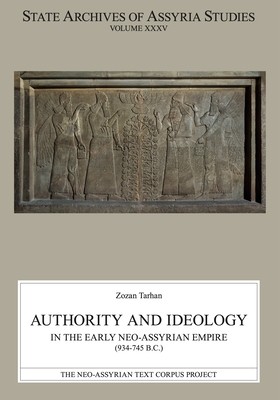
- We will send in 10–14 business days.
- Author: Zozan Tarhan
- Publisher: Neo-Assyrian Text Corpus Project
- ISBN-10: 9515185874
- ISBN-13: 9789515185877
- Format: 17.8 x 24.8 x 1.9 cm, minkšti viršeliai
- Language: English
- SAVE -10% with code: EXTRA
Authority and Ideology in the Early Neo-Assyrian Empire (934-745 B.C.) (e-book) (used book) | bookbook.eu
Reviews
Description
This monograph explores royal authority and ideology in the early Neo-Assyrian Empire (934-745 B.C.). It comprises four parts: (I) an overview of the sources, (II) a historical introduction to Assyria prior to the Neo-Assyrian period, and the two main sections devoted to analyzing (III) authority and (IV) ideology. Part III focuses on the reigns of the ten Assyrian kings of this period and studies their military, political, and building activities. This section discussed issues of authority in the context of military and political events, including Assyrian expansion, military campaigns, and building projects, as well as clarifying uncertain dating and chronology of events. Part IV studies the ideological framework of the actions of the Assyrian kings--that is, the justifications and motivations for their deeds--by analyzing the ideological motifs, beliefs, and messages of textual and visual narratives. Tarhan investigates Assyrian royal ideology from multiple angles, considering its religious nature, the imperial mission, and the portrayal and different roles of the Assyrian king.
The methodology combines philological work with cuneiform texts, analyses of iconographic sources, and archaeological data. The book aims to provide a comprehensive historical and cultural analysis of the reigns of the Assyrian rulers and the ideology of kingship. It tackles a desideratum of Assyriology and contributes to ancient Near Eastern studies and ancient history in general by tracing the constants and variations in Assyrian royal ideology.
EXTRA 10 % discount with code: EXTRA
The promotion ends in 21d.15:50:10
The discount code is valid when purchasing from 10 €. Discounts do not stack.
- Author: Zozan Tarhan
- Publisher: Neo-Assyrian Text Corpus Project
- ISBN-10: 9515185874
- ISBN-13: 9789515185877
- Format: 17.8 x 24.8 x 1.9 cm, minkšti viršeliai
- Language: English English
This monograph explores royal authority and ideology in the early Neo-Assyrian Empire (934-745 B.C.). It comprises four parts: (I) an overview of the sources, (II) a historical introduction to Assyria prior to the Neo-Assyrian period, and the two main sections devoted to analyzing (III) authority and (IV) ideology. Part III focuses on the reigns of the ten Assyrian kings of this period and studies their military, political, and building activities. This section discussed issues of authority in the context of military and political events, including Assyrian expansion, military campaigns, and building projects, as well as clarifying uncertain dating and chronology of events. Part IV studies the ideological framework of the actions of the Assyrian kings--that is, the justifications and motivations for their deeds--by analyzing the ideological motifs, beliefs, and messages of textual and visual narratives. Tarhan investigates Assyrian royal ideology from multiple angles, considering its religious nature, the imperial mission, and the portrayal and different roles of the Assyrian king.
The methodology combines philological work with cuneiform texts, analyses of iconographic sources, and archaeological data. The book aims to provide a comprehensive historical and cultural analysis of the reigns of the Assyrian rulers and the ideology of kingship. It tackles a desideratum of Assyriology and contributes to ancient Near Eastern studies and ancient history in general by tracing the constants and variations in Assyrian royal ideology.


Reviews